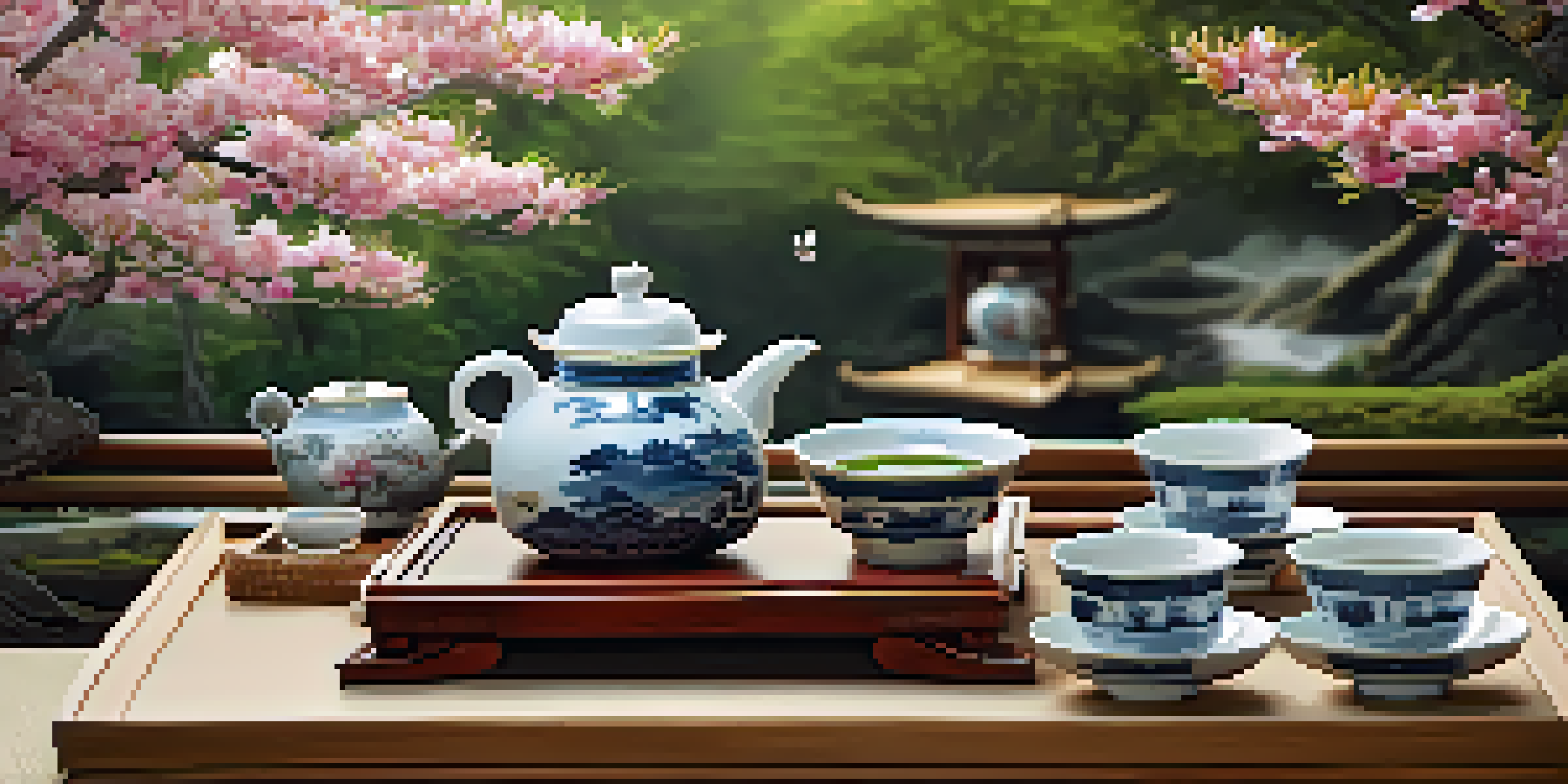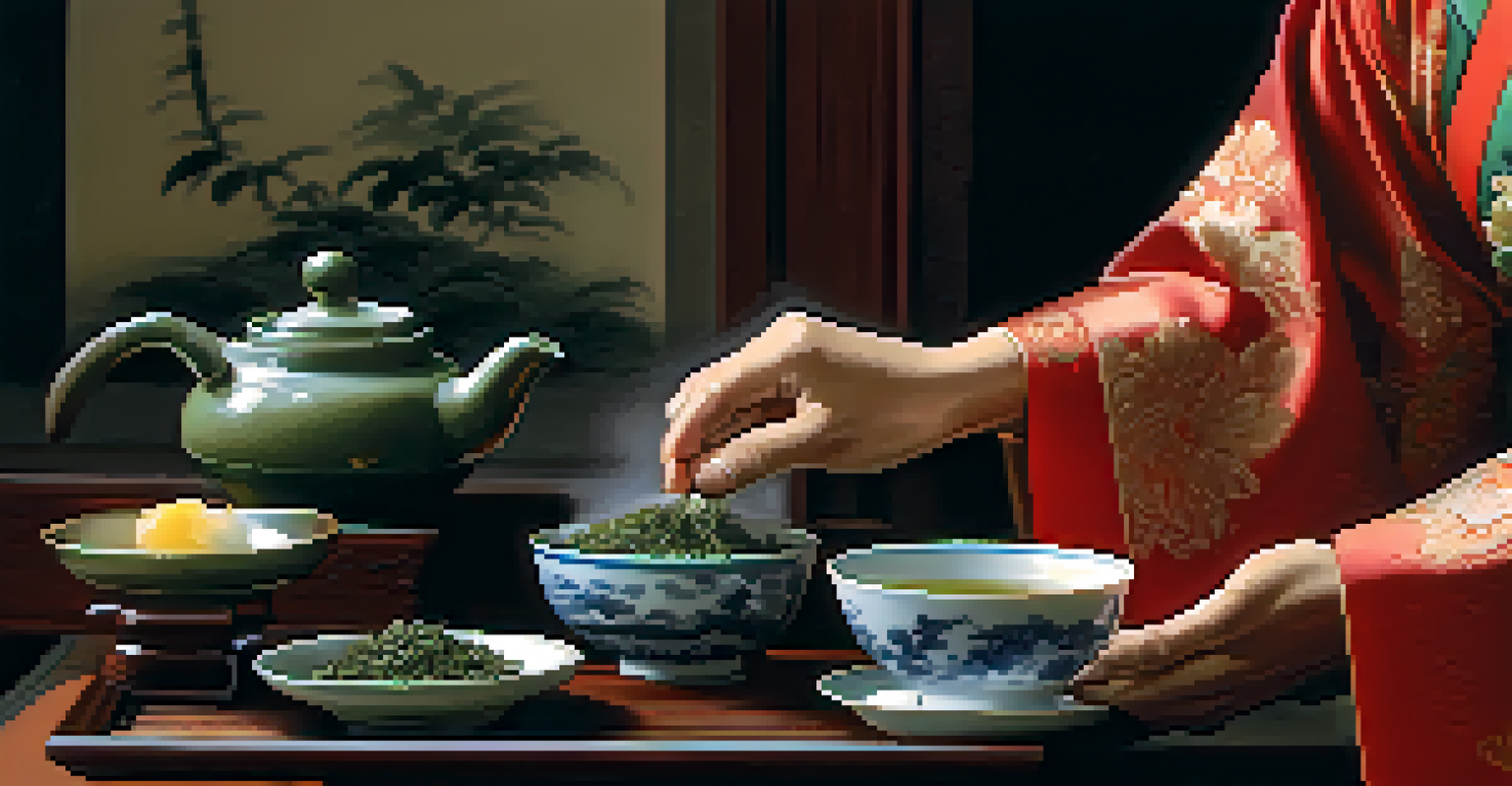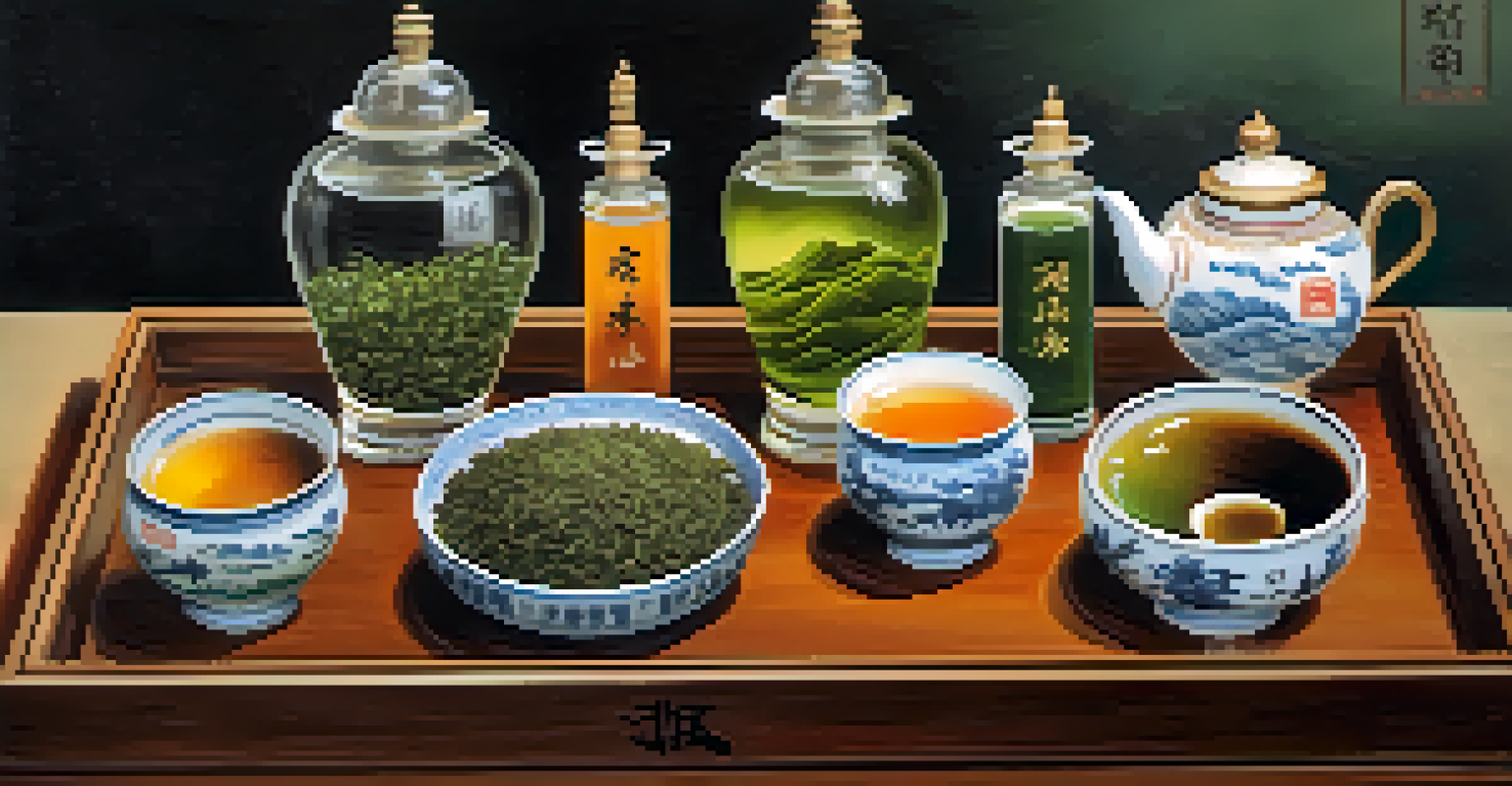Experiencing Luxury Traditional Tea Ceremonies in China

The Art and History of Chinese Tea Ceremonies
Chinese tea ceremonies are steeped in history, reflecting centuries of culture and tradition. Originating over 5,000 years ago, tea has evolved from a medicinal drink to a symbol of hospitality and respect. These ceremonies are not merely about drinking tea; they encompass a holistic experience that engages the senses, spirituality, and artistry.
Tea is the magic elixir that brings people together and fosters connection.
Each ceremony is unique, with various styles depending on the region and cultural influences. For example, the Gongfu tea ceremony, popular in Southern China, emphasizes skill and precision, showcasing the beauty of the tea leaves and the brewing process. This artistic aspect transforms tea preparation into a form of meditation, inviting participants to slow down and appreciate the moment.
As you partake in a tea ceremony, you’re not just sipping a beverage; you're immersing yourself in a rich narrative that spans generations. This connection to history and tradition enhances the experience, allowing you to appreciate the significance of each ritual and gesture.
Choosing the Right Setting for Your Tea Ceremony
When seeking a luxury tea ceremony in China, the setting plays a crucial role in the overall experience. High-end tea houses often feature elegant decor, serene gardens, and tranquil environments that enhance the ambiance. Some venues even offer stunning views of iconic landmarks, adding a touch of grandeur to your tea experience.

Consider venues that prioritize authentic traditions, using high-quality teas sourced from renowned regions like Yunnan or Fujian. These establishments often have knowledgeable staff who can guide you through the nuances of each tea type, elevating your understanding and appreciation. It's like having a personal tour guide for your taste buds!
Rich History of Chinese Tea Ceremonies
Chinese tea ceremonies are a blend of centuries-old traditions, emphasizing the art and mindfulness of tea preparation.
Moreover, the atmosphere should encourage relaxation and reflection, allowing you to escape the hustle and bustle of everyday life. Whether it's a quiet corner of a traditional tea house or an outdoor garden, the setting enhances the sensory journey that a tea ceremony promises.
The Rituals and Techniques of Tea Preparation
At the heart of every tea ceremony are the meticulous rituals and techniques used to prepare the tea. From selecting the right tea leaves to the precise water temperature, each step is crucial in achieving the perfect brew. For instance, using boiling water for delicate green tea can result in a bitter taste, while lower temperatures bring out its subtle flavors.
Where there’s tea, there’s hope.
During the ceremony, the host performs various actions with grace and care, making the experience visually captivating. The pouring of tea is often accompanied by thoughtful gestures, such as warming the cups and sharing the first pour with guests. This not only showcases the host's skills but also fosters a sense of community and connection among participants.
Understanding these rituals can deepen your appreciation for the art of tea. It’s a reminder that every cup of tea tells a story, shaped by the hands of those who brew it and the traditions that have been passed down through generations.
Types of Teas Commonly Used in Ceremonies
The variety of teas used in Chinese ceremonies is vast, each with its own unique flavor profile and significance. Green tea, known for its fresh and delicate taste, symbolizes health and vitality, making it a popular choice. On the other hand, oolong tea, with its complex flavors, represents harmony and balance, ideal for leisurely ceremonies.
Additionally, pu-erh tea, often aged for years, offers a rich and earthy taste that many connoisseurs appreciate. This tea is typically served during more formal occasions, showcasing the depth and history behind each sip. Participating in a ceremony provides an opportunity to explore these diverse flavors and discover your personal favorites.
Mindfulness Enhances the Experience
The practice of mindfulness during tea ceremonies fosters deeper connections and appreciation for the moment.
The selection of tea not only enhances the experience but also invites discussions about the origins and benefits of each type. As you taste different varieties, you’ll find yourself delving into the cultural significance that each tea holds, making the experience even more enriching.
The Role of Mindfulness in Tea Ceremonies
Mindfulness plays a significant role in tea ceremonies, transforming the act of drinking tea into a meditative practice. Participants are encouraged to be present, focusing on the aroma, color, and taste of the tea, which fosters a deeper connection to the moment. This practice aligns with the philosophy of 'Wu Wei,' or effortless action, promoting a sense of peace and tranquility.
As the host prepares the tea, each movement is deliberate, inviting participants to slow down and appreciate the process. This attention to detail cultivates an environment where conversations flow naturally, and connections deepen. It’s an invitation to embrace simplicity and find joy in the little things.
In our fast-paced world, engaging in a mindful tea ceremony can provide a much-needed respite. It serves as a reminder to step back, breathe, and savor life’s simple pleasures, making each sip a moment to cherish.
The Cultural Significance of Tea in China
Tea holds a central place in Chinese culture, symbolizing respect, friendship, and hospitality. Offering tea to guests is a gesture of goodwill, often seen during important occasions like weddings and family gatherings. This cultural practice reflects the values of community and connection that are deeply ingrained in Chinese society.
Furthermore, tea is often used in traditional Chinese medicine, believed to have numerous health benefits. From aiding digestion to promoting relaxation, the significance of tea extends beyond mere enjoyment. It embodies a philosophy of balance and wellness, reinforcing the idea that what we consume affects our overall well-being.
Cultural Significance of Tea
Tea symbolizes hospitality and friendship in Chinese culture, serving as a vital part of social interactions and traditions.
Understanding the cultural significance of tea deepens your appreciation for the ceremony itself. It’s not just about the drink; it’s about the relationships built and nurtured over shared cups, highlighting the profound impact of tea on social interactions.
How to Experience a Tea Ceremony in China
Experiencing a traditional tea ceremony in China is an adventure that requires a bit of planning. Start by researching reputable tea houses or hotels that offer luxury tea experiences. Many establishments provide packages that include guided ceremonies, allowing you to fully immerse yourself in the process.
Consider joining a tea tour, where knowledgeable guides can take you to various venues and introduce you to different types of tea and brewing techniques. This not only enhances your experience but also allows you to meet fellow tea enthusiasts, making it a social affair.

Lastly, don’t forget to ask questions during the ceremony! Engaging with the host about the teas, rituals, and cultural context can enrich your understanding and make the experience even more memorable. Remember, this journey is as much about learning as it is about savoring the exquisite flavors of traditional Chinese tea.